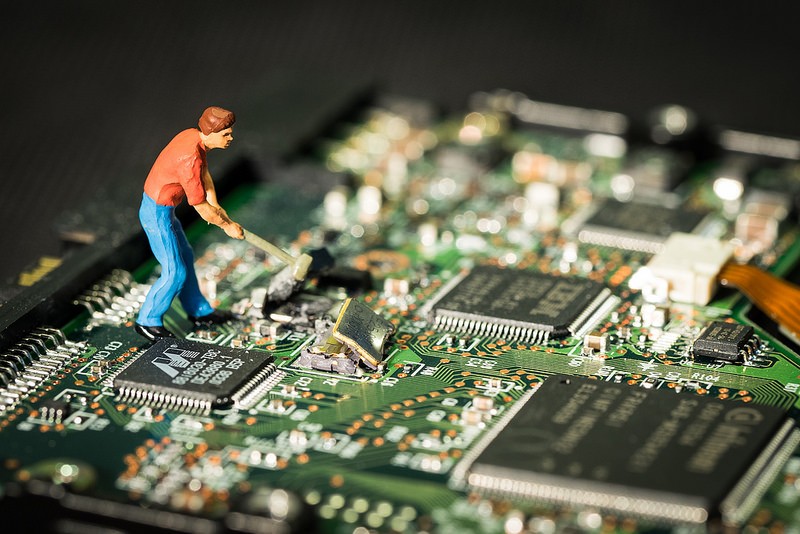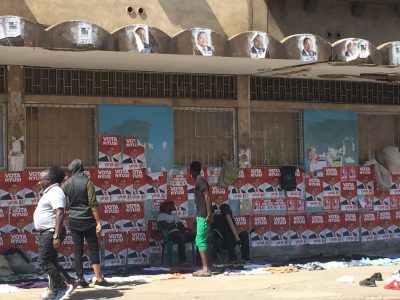
“Hacker” by the Preiser Project via Flickr. (CC BY 2.0)
The Advox Netizen Report offers an international snapshot of challenges, victories, and emerging trends in technology and human rights around the world. This report covers news and events from September 6 – 13, 2019.
Wikipedia was offline for several hours on September 6 and 7 in countries across Europe, the Middle East and North America, due to what the Wikimedia Foundation says was a malicious cyber attack on site infrastructure in the US and EU.
Although Wikipedia has long been blocked in Turkey and China, and has been blocked temporarily in other countries, such as Venezuela, these measures have been taken by government authorities who typically cite a legal justification for their decisions.
In this case, the outage was completely unexpected, and did not happen at the hands of any government official. Instead, it appears to have been the result of scores of devices contacting the site at once, in a distributed denial of service (DDoS) attack.
An entity known on Twitter as @UkDrillas has claimed responsibility for the attack, though this has not been confirmed. Although the entity’s Twitter account has now been suspended, the Israeli news outlet Haaretz managed to capture and publish a screenshot of their feed, which offers a detailed timeline of the Wikipedia outages. Haaretz also quoted a tweet in which @UkDrillas indicated that the attack involved “testing some new IOT devices,” suggesting that the attack was carried out not by people or bots sending data requests from regular computers, but rather by a network of internet-enabled household appliances or “Internet of Things (IoT)” devices, such as “smart” refrigerators.
The cybersecurity blog HackRead noted that attacks carried out via IoT devices have become increasingly common in recent years:
It is worth mentioning that lately, hackers have been using vulnerable and unauthentic smart devices such as vending machines security cameras, coffee machines, Smart TV, and even Internet-connected cars to conduct DDoS and ransomware attacks.
In an official blog post about the incident, the Wikimedia Foundation wrote:
We condemn these sorts of attacks. They’re not just about taking Wikipedia offline. Takedown attacks threaten everyone’s fundamental rights to freely access and share information.
Twitter gives the boot to Raul Castro and Cuban state media
On September 12, Cuban media reported that the Twitter accounts of former president Raul Castro and multiple Cuban state-run media outlets were suspended without warning. Responding to an inquiry from Reuters, Twitter officials said “the company’s platform manipulation policies prohibit users artificially amplifying or disrupting conversations by using multiple accounts.” Some of the accounts were restored by the end of the day, including the official account of Granma, the national daily newspaper and official organ of the Communist Party of Cuba. The official account of Raul Castro was still offline at the time of publication.
While it is not uncommon for state media accounts to repeat messages coming from party officials, which in some cases might constitute a violation of Twitter’s policies and trigger suspension, these accounts nevertheless play a unique public interest role as an official information source. And once blocked, their URLs simply lead to the generic “account suspended” page, leaving no public record of what the account posted in the past.
In a Twitter thread about the incident, Cuban journalist and Global Voices author Elaine Diaz wrote:
Entre las cuentas bloqueadas se encuentran los medios más importantes para conocer la versión oficial del gobierno cubano en un momento de crisis e incertidumbre. Mientras no se explique qué ocurrió esto sigue siendo un acto de censura que debe ser denunciado.
Among the blocked accounts are those belonging to media outlets that are most important for understanding the Cuban government’s official version [of facts] in moments of crisis or uncertainty. As long as there is no explanation of what happened, this will continue to be an act of censorship that should be condemned.
Japanese reporter could face 3,000 USD fine for a retweet
Journalist Yasumi Iwakami may have to pay a fine for retweeting a message suggesting that staff working under a former state governor had been driven to suicide. Although Iwakami later deleted the retweet, former Osaka governor Toru Hashimoto still brought a defamation case against the journalist, seeking 1.1 million yen (around 10,000 USD) in damages. An Osaka court ruled on September 12 that Iwakami would need to pay one third of the amount, citing his influence — Iwakami has 180k Twitter followers — and the fact that the original statement could not be proven.
Singapore’s PM goes after embattled local media editor
Singapore Prime Minister Lee Hsien Loong is suing Terry Xu, chief editor of independent news website The Online Citizen, for defamation over an article in which Xu criticized the leader’s public feud with his siblings. In Singapore, defamation is an offense that carries a maximum penalty of a two-year prison sentence and a fine.
Critics say this is another example of the government’s harsh treatment of independent media and other groups that report about dissenting views against the country’s authorities — even Xu has been accused of defamation in the past, also by the ruling government.
Journalist and activist Kirsten Han challenged the prime minister’s decision to target people who are merely repeating statements made by his siblings:
If the comments are so harmful to his reputation, why is he not suing his siblings and allowing their comments to remain up online? If those comments can remain publicly available, why is it that repeating them will attract a lawsuit claiming that one has harmed his reputation?
The internet is finally back in Papua
The Indonesian government finally restored internet access in West Papua and Papua provinces on September 5, ending the shutdown that began August 21, after protests mounted against military abuse.
The protests and shutdown came after a confrontation in which army officers called Papuan students “monkeys” — a racial slur commonly used against Papuans, who typically have darker skin than Austronesian Indonesians. On August 17, an estimated 42 students were detained by police overnight. Protests and riots in response to the detentions and soldiers’ use of racial slurs followed in both provinces and other Indonesian cities.
Government officials said the internet shutdown was intended to curb the flow of fake news and hoaxes amid protests. In a press statement, a senior security minister warned that “if [security] conditions worsen, which we hope will not, we will block the internet again.”
Papuan journalist Arnold Belau in Papua told Global Voices on September 9 that despite the lifted ban, internet access and mobile data services in the provincial capital of Papua Jayapura are still patchy.
New research
- Source Hacking: Media Manipulation in Practice – Joan Donovan and Brian Friedberg, Data & Society
Subscribe to the Netizen Report
Oiwan Lam, Mong Palatino, Juke Carolina Rumuat, Taisa Sganzerla and Nevin Thompson contributed to this report.



